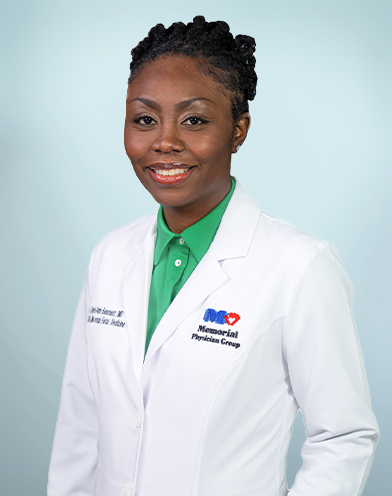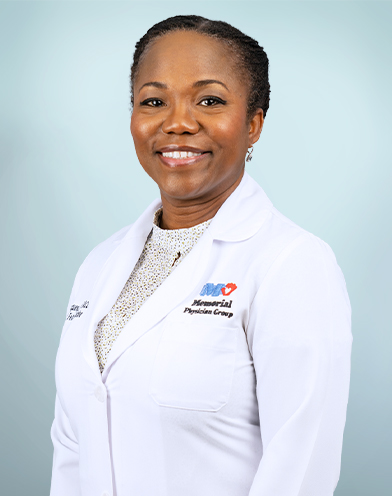The Next Step Videos
OB/GYN Referral
If your OB/GYN has concerns about your pregnancy, they will refer you to our MFM specialists. You cannot schedule an appointment with our specialists directly.
Providing Exceptional Care — and Empowering Experiences — to You and Your Baby
For some people, pregnancy poses risk for complications beyond their control. Doctors often describe these as high-risk pregnancies.
If your Obstetrician/Gynecologist (OB/GYN) has concerns about your pregnancy, they may refer you to a Maternal-Fetal Medicine (MFM) specialist. An MFM specialist — also known as a perinatologist — is a doctor with special training in high-risk pregnancy care. They work with your OB/GYN to co-manage and coordinate your ultrasounds, blood tests, treatments or monitoring you need to keep you and your baby safe and healthy.
What’s the Difference Between an MFM Specialist and an OB/GYN?
All MFM specialists are OB/GYNs. Both groups complete a four-year residency training to provide care during pregnancy, labor and delivery, and after your baby arrives.
However, not all OB/GYNs are MFM specialists. That’s because MFM specialists complete three years of additional fellowship training in high-risk pregnancy care after finishing their OB/GYN training.
At Memorial Healthcare System, our MFM specialists are double board-certified in both Obstetrics and Gynecology and Maternal-Fetal Medicine. Those with the additional board certification passed rigorous written and oral exams related to high-risk pregnancy care.
Who Can Benefit From Maternal-Fetal Medicine Care?
Your regular OB/GYN may refer you to an MFM specialist if:
- You have a medical condition that can make pregnancy risky, such as diabetes or high blood pressure.
- You develop a pregnancy-related condition such as preeclampsia, gestational diabetes, placenta previa, or placenta accreta.
- You have a history of preterm (premature) birth.
- You’re carrying multiples, such as twins or triplets.
- Your prenatal tests show your baby might have a genetic or medical problem, such as congenital (present at birth) heart disease.
Learn about other factors that can make a pregnancy high-risk.
Improving Outcomes for Black and Brown Maternity Patients

Maternal-Fetal Medicine Services We Offer
No matter what type of care you and your baby need, you’ll find it at Memorial Healthcare System. We offer a wide range of services that help us diagnose and manage even the most serious illnesses and complications in pregnancy.
These services include:
Our MFM specialists use state-of-the-art imaging equipment to perform fetal ultrasounds to evaluate and monitor your baby’s development. We also use these tests to confirm or rule out medical problems while your baby is still in the womb.
Before your baby’s birth, we offer the option of either genetic screening or diagnostic tests to see if your baby has or is at low or high risk of certain genetic conditions, such as Down syndrome. We provide diagnostic tests, such as chorionic villus sampling (CVS) and amniocentesis, to confirm whether your baby has a genetic condition.
If you or your baby need 24/7 monitoring or care, we’ll admit you to a special area of the hospital called the antepartum unit. We reserve this unit for patients who may need to stay in the hospital for days to several weeks or months before giving birth.
Memorial Regional Hospital Family Birthplace is next to Joe DiMaggio Children’s Hospital's Level IV NICU, the highest level of neonatal intensive care available. This means we’re equipped to care for even the tiniest or sickest newborns.
We have a unique Placenta Accreta Spectrum Program for patients whose placenta attaches itself to (or grows into or through) the uterus. Our MFM specialists monitor you and help you plan for delivery. Memorial Healthcare System’s High-risk OB hospitalists manage these complex deliveries.
Learn more about the prenatal and labor and delivery services we offer patients with high-risk pregnancies.
Our MFM Specialists’ Approach to Care
When you see one of our MFM specialists for high-risk pregnancy care, you can expect:
We know you have lots of questions and concerns about your baby’s health, and we’re here to address them. We’ll provide clear information about why we consider your pregnancy high-risk. And we’ll make sure you understand — and have a say in — your treatment options.
Your MFM specialist will work closely with your OB/GYN throughout your pregnancy to manage your prenatal care, as well as coordinate with any specialists who will care for you and/or your baby.
We practice evidence based medicine guided by the American College of Obstetrics and Gynecology and the Society for Maternal-Fetal Medicine.
Why is this important? Because doctors and researchers constantly discover better ways to care for people with high-risk pregnancies — and we have a responsibility to make sure our patients benefit from these discoveries.
For example, we now know that people at risk for preeclampsia can lower their risk by taking low-dose aspirin during pregnancy.












